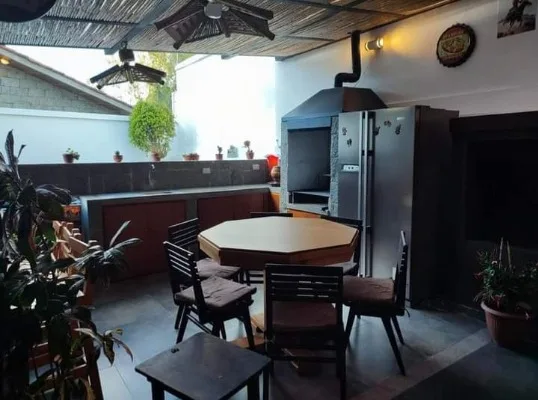Christmas after the flood: Industrious residents of a devastated neighborhood help each other rebuild

Devastation from a March landslide, west of Sayausí, is still visible on the highway heading into the Cajas Mountains.
By Jeremiah Reardon
From the vantage point of our fifth-floor apartment and its ample patio, I enjoy the panorama of the Andes’ green hills to the west, changing from sun lit to shadows cast by clouds. They give me a secure feeling because our water comes from its streams, and much of our produce and fruit come from its indigenous farms there. Sunsets keep my wife Belinda and myself entranced when pastel colors streak across the western sky as the light fades.
 On a Sunday afternoon in the midst of the holiday season, I went for a hike in the Cajas Mountains. I caught a city bus to Feria Libre, the westside indigenous mercado. Some grasping bulky packages, ten of us got on the Sayausí bus. I watched across the aisle as a couple of women smiled at a two-year-old girl who bounced enthusiastically on the knee of one of them. The bus gear shift had a furry animal mascot wrapped round it, green-yellow eyes looking back at the passengers. Perhaps its mischievous grin had excited the child.
On a Sunday afternoon in the midst of the holiday season, I went for a hike in the Cajas Mountains. I caught a city bus to Feria Libre, the westside indigenous mercado. Some grasping bulky packages, ten of us got on the Sayausí bus. I watched across the aisle as a couple of women smiled at a two-year-old girl who bounced enthusiastically on the knee of one of them. The bus gear shift had a furry animal mascot wrapped round it, green-yellow eyes looking back at the passengers. Perhaps its mischievous grin had excited the child.
Within a half hour the bus halted at a roadway construction site at the far end of town. The driver turned to tell me, his last passenger on board, “This is the end of the line. I have to turn around.” Ten workers and several supervisors had blocked traffic to allow earth-moving equipment to refill the lane on the downhill slope. Erosion had caused sinkholes which I later learned in the news.
 Two kilometers short of its scheduled final stop, travel had been interrupted. I stepped off and assessed my options; I decided to walk, hoping for the offer of a lift. In March the community into which I walked had suffered a calamity. Pounding rainfall dislodged rocks and boulders; mudslides followed in their path. Several homes had turned into desolate mounds of concrete rubble and splintered timbers. Tragically, several people lost their lives, and others had been injured.
Two kilometers short of its scheduled final stop, travel had been interrupted. I stepped off and assessed my options; I decided to walk, hoping for the offer of a lift. In March the community into which I walked had suffered a calamity. Pounding rainfall dislodged rocks and boulders; mudslides followed in their path. Several homes had turned into desolate mounds of concrete rubble and splintered timbers. Tragically, several people lost their lives, and others had been injured.
Local communities organized charitable drives headed by women. They cooked meals for the displaced and workers, donated supplies and provided temporary housing. From rural indigenous communities like Gulag and Marianza, destitute residents took refuge in homes offered by Sayausi friends and relatives.
 I thought of my friends in Kallpa Warmi, Kichwa for “Strong Women.” Four years ago, I had written a CuencaHighLife article about the indigenous women’s cooperative at the request of an expat charity, Hearts of Gold. A couple of months later, they had invited me to their Christmas party at a community center close to the intersection of the roadblock.
I thought of my friends in Kallpa Warmi, Kichwa for “Strong Women.” Four years ago, I had written a CuencaHighLife article about the indigenous women’s cooperative at the request of an expat charity, Hearts of Gold. A couple of months later, they had invited me to their Christmas party at a community center close to the intersection of the roadblock.
My walk brought me to the epicenter of March’s tragedy. Land practices by farmers contributed to the swath of exposed soil and scattered boulders. To clear ground for pasture and planting above the highway, farm workers had removed trees and vegetation from tracts of land which had previously absorbed the rain. Also, numerous creeks that normally cascaded over and under the roadway to the river had been dammed. Manmade structures gave way under the unrelenting onslaught of the constant rain.
I ambled uphill hoping for a ride to Laguna Llaviucu, the nearest attraction in the national park at the fifteen-kilometer mark. No taxis passed, and the infrequent tourist van sped past, ignoring my outstretched arm. Motorcycle traffic dominated the road. An occasional dump truck with a load of crushed stone returned to the worksite. I trudged uphill from #7 to #11 KM markers, about a two-and-a-half-mile hike. Along the way I exchanged greetings with fellow pedestrians and folks at home. Across the front of concrete and cinderblock homes, Christmas lights had been strung. I saw only a few Christmas trees. White-painted concrete shelters contained religious statues, candles and flowers, a testament to the community’s devotion. I noted a cross painted on a stone at the road’s edge next to a utility pole, signifying a fatal vehicle accident.
 At around 4:30 P.M. the sun eased behind a mountain to the southwest. The temperature dropped suddenly and I fished out my jacket from my pack. Time to return to Cuenca, I chanced into a couple of shops. I recognized a trout fishpond in front of one where I had shopped before. Eager to bring home a few for dinner, no one responded to my knock on the front door. Across the street a neighbor leaned out his window. “They are closed,” he informed me in Spanish.
At around 4:30 P.M. the sun eased behind a mountain to the southwest. The temperature dropped suddenly and I fished out my jacket from my pack. Time to return to Cuenca, I chanced into a couple of shops. I recognized a trout fishpond in front of one where I had shopped before. Eager to bring home a few for dinner, no one responded to my knock on the front door. Across the street a neighbor leaned out his window. “They are closed,” he informed me in Spanish.
Another kilometer downhill I stopped at a market. The only customer of a young female clerk, I purchased mangoes, tomatoes and bananas to add to my backpack.
 Walking past homes built close to the road, I felt grateful that the owners’ dogs didn’t bark or threaten to bite as is their wont in other sections of the city. A woman chatted with neighbors while holding the leash of a cute Chihuahua puppy. I caught up with a young man whom I’d seen earlier walking with a woman in indigenous dress. “How do you do?” I asked. In his thirties, he wore casual clothes and spoke halting English.
Walking past homes built close to the road, I felt grateful that the owners’ dogs didn’t bark or threaten to bite as is their wont in other sections of the city. A woman chatted with neighbors while holding the leash of a cute Chihuahua puppy. I caught up with a young man whom I’d seen earlier walking with a woman in indigenous dress. “How do you do?” I asked. In his thirties, he wore casual clothes and spoke halting English.
“Hello. How are you?” he replied. “Where are you from?”
“California,” I said.
“Thirteen years ago I lived in the United States. My name is Wilson.”
“Nice to meet you Wilson. I’m Jeremiah. I know another Wilson, Wilson Prado and his brothers,” I told him. “They run a restaurant and offer sport fishing at their hacienda farther up the road.”
“Wilson is my friend!” he exclaimed, sounding pleased to have this common bond.
 “Where did you live in the States?”, I asked.
“Where did you live in the States?”, I asked.
“In New York. I lived in Queens and hung drywall,” my new friend stated.
“I’m a carpenter,” I replied. “I make furniture.”
“Now, I trim trees,” he said, sweeping his arm in the direction of hills with trees at the top silhouetted against the sky. Earlier, at several roadside lots, I saw neatly stacked cords of eucalyptus firewood for sale. It triggered the memory of my Vermont cabin’s potbelly stove giving off heat while a red blaze gave off light.
In a couple more kilometers we parted company in front of a shop where Wilson’s friends greeted him. Shortly, I returned to the roadblock. Workers hurried to spread the last load of crushed stone before they ran out of daylight. A steamroller rumbled forward in the trench below the remaining blacktop where supervisors and pedestrians stood and watched.
 Three red and white city buses destined for its eastside sat empty while their drivers took a smoke break. The driver of the first bus ducked under the engine hood. I shined my smartphone flashlight as he struggled to connect a short wire to a red and blue light-panel. It personalized his bus to differentiate it from others in the company’s fleet.
Three red and white city buses destined for its eastside sat empty while their drivers took a smoke break. The driver of the first bus ducked under the engine hood. I shined my smartphone flashlight as he struggled to connect a short wire to a red and blue light-panel. It personalized his bus to differentiate it from others in the company’s fleet.
We passengers soon got on board; about a dozen of us flashed our bus cards in front of a meter before taking our seats. We rode past closed businesses, open restaurants and soon came to Gringolandia, a community of high-rise apartment buildings popular with expats. Belinda jokingly refers to the area as “Brooklyn.” With cellphone service now available after departing from the mountains, I called to tell her I’d be home soon. “Please pick up butter, Dear,” she asked.
“OK, Belinda. Expect me home in about an hour.”
I hopped off the bus at a stop next to a gas station. The driver and I exchanged waves as I hurried across the four-lane street. A short walk and a dozen steps took me to the Avenida Las Americas shopping mall. Under hallway lights, musicians packed their instruments. Several rows of folding chairs stood empty. Vendors at kiosks hastily placed holiday-themed sales items into plastic bins. The number of Sunday shoppers in Supermaxi surprised me. Perhaps they had been attracted by the Christmas event put on by the city as indicated by its banners at the bandstand.
 This seasonal gathering reinforced the hope stirred in me by my day’s outing. The magnetism of the mountains which had drawn me that Sunday like circling insects attract trout, had reintroduced me to our industrious neighbors. When buses resume their routes connecting Cuenca to the Pacific Coast, I’ll be back.
This seasonal gathering reinforced the hope stirred in me by my day’s outing. The magnetism of the mountains which had drawn me that Sunday like circling insects attract trout, had reintroduced me to our industrious neighbors. When buses resume their routes connecting Cuenca to the Pacific Coast, I’ll be back.
____________________
Photos by Jeremiah Reardon
















